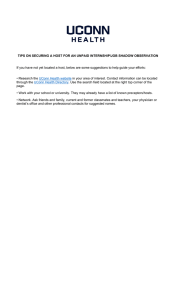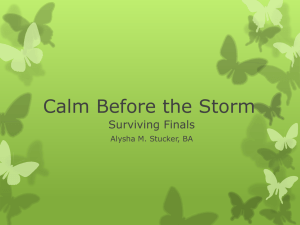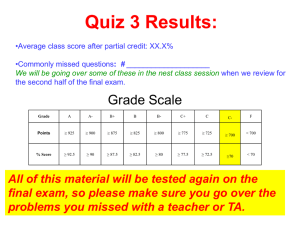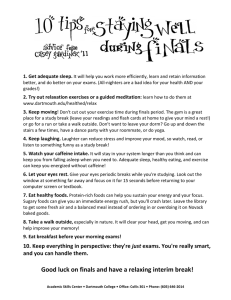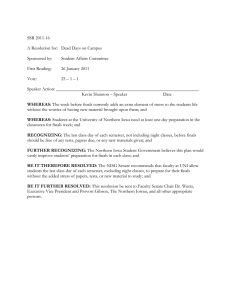Spring 2014 ANSC/NUSC 1645 COURSE OUTLINE THE SCIENCE OF FOOD
advertisement
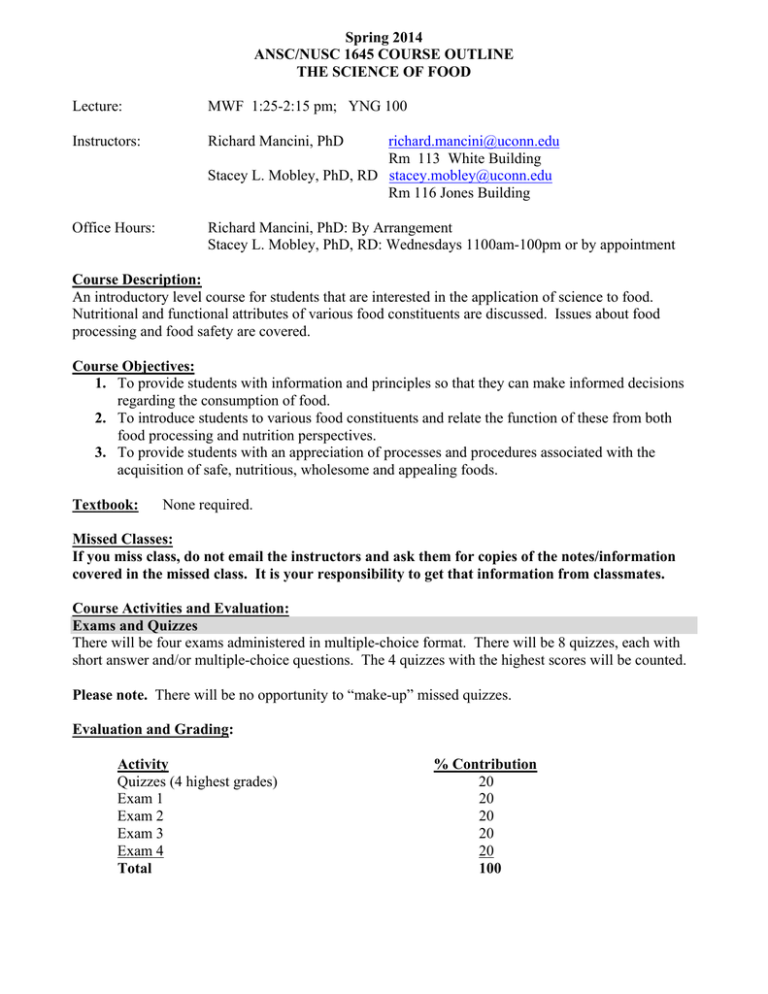
Spring 2014 ANSC/NUSC 1645 COURSE OUTLINE THE SCIENCE OF FOOD Lecture: MWF 1:25-2:15 pm; YNG 100 Instructors: Richard Mancini, PhD richard.mancini@uconn.edu Rm 113 White Building Stacey L. Mobley, PhD, RD stacey.mobley@uconn.edu Rm 116 Jones Building Office Hours: Richard Mancini, PhD: By Arrangement Stacey L. Mobley, PhD, RD: Wednesdays 1100am-100pm or by appointment Course Description: An introductory level course for students that are interested in the application of science to food. Nutritional and functional attributes of various food constituents are discussed. Issues about food processing and food safety are covered. Course Objectives: 1. To provide students with information and principles so that they can make informed decisions regarding the consumption of food. 2. To introduce students to various food constituents and relate the function of these from both food processing and nutrition perspectives. 3. To provide students with an appreciation of processes and procedures associated with the acquisition of safe, nutritious, wholesome and appealing foods. Textbook: None required. Missed Classes: If you miss class, do not email the instructors and ask them for copies of the notes/information covered in the missed class. It is your responsibility to get that information from classmates. Course Activities and Evaluation: Exams and Quizzes There will be four exams administered in multiple-choice format. There will be 8 quizzes, each with short answer and/or multiple-choice questions. The 4 quizzes with the highest scores will be counted. Please note. There will be no opportunity to “make-up” missed quizzes. Evaluation and Grading: Activity Quizzes (4 highest grades) Exam 1 Exam 2 Exam 3 Exam 4 Total % Contribution 20 20 20 20 20 100 Date Jan 22 24 27 29 31 Feb 3 5* 7 10 12 14* 17 19 21 24 26* 28 Mar 3 5* 7 10 12 14 24 26 28 *31 Apr 2 4 7 9 *11 14 16 *18 21 23 *25 28 30 May 2 5-11 (TBD) *Denotes date of quiz. Class Schedule - The Science of Food – Spring 2014 Scheduled Topic/Activity Introduction to class Food Lipids Food Protein Food Protein and Enzymes Food Carbohydrates Food Processing Food Packaging Food Ingredients Food Colors and Flavors Food Quality and Deterioration Food Evaluation Review Exam 1 Muscle Foods Dairy Foods Dairy Foods Poultry and Eggs Fruits and Vegetables Food Microbiology Review Exam 2 Foods/Nutrients Defined and Classified Food/Nutrient Intakes in the US SPRING BREAK Determinants of Eating Behaviors at the Social and Cultural Level Determinants of Eating Behaviors at the Psychobiological Level Physiology of Taste Sensation to Food Physiology of Taste Sensation to Food (continued) Biological Regulation of Food/Nutrient Intake Digestion and Absorption of Food Constituents Exam 3 Chemistry and Bioavailability of Vitamins Chemistry and Bioavailability of Minerals Phytochemicals in our Food Fortified Enriched, Fortified, Organic, and Functional Foods Complementary and Alternative Medicine- Dietary and Herbal Supplements Genetically Modified Foods Safety of Our Food Supply Food and Nutritional Deficiencies in Humans Food and Nutrient Interaction with Genes in Humans (Nutrigenomics) Roles and Controversies: Antioxidants, Supplements, and GMO Foods Catch-up; Review Exam 4 Statement on late work and make-up policy Instructors are strongly encouraged to make reasonable accommodations in response to student requests to complete work missed by absence resulting from observation of religious holidays. Such accommodations should be made in ways that do not dilute or preclude the requirements or learning outcomes for the course. Students anticipating such a conflict must inform their instructor in writing within the first three weeks of the semester, and prior to the anticipated absence, and must take the initiative to work out with the instructor a schedule for making up missed work. Accommodating student requests to complete work missed by absence resulting from extra-curricular/co– curricular activities performed in the interest of the university and/or those that support the scholarly development of the student should be made in ways that do not dilute or preclude the requirements or learning outcomes for the course. Examples include participation in scholarly presentations, performing arts, and intercollegiate sports, when the participation is at the request of, or coordinated by, a University official. Students involved in such activities should inform their instructor in writing prior to the anticipated absence and take the initiative to make up missed work in a timely fashion. Statement of students with disabilities If anyone has needs requiring special assistance, please see the instructor so arrangements can be made. http://www.csd.uconn.edu/accommodation_services.html for overview of accommodations http://www.csd.uconn.edu/ for Center for Students with Disabilities http://www.ossa.uconn.edu/ for Office of Student Affairs and Advocacy Cheating and plagiarism policy: Website from handbook; see Appendix A Code of Conduct http://www.community.uconn.edu/student_code_appendixa.html http://freshmanenglish.uconn.edu/instructors/forms/plagiarism.php Cheating - Student Academic Misconduct: Academic misconduct is dishonest or unethical academic behavior that includes, but is not limited, to misrepresenting mastery in an academic area (e.g., cheating), intentionally or knowingly failing to properly credit information, research or ideas to their rightful originators or representing such information, research or ideas as your own (e.g., plagiarism). Office of Student Services policy on rescheduling of finals: http://www.ossa.uconn.edu/docs/Final_Examination_Information.pdf Students may receive permission to reschedule a final if they have finals which are “bunched” or if a student has an “extenuating circumstance”. If approval is granted, it is expected that students will inform instructors of their conflict(s) prior to the final. To access the finals schedule, go to: www.registrar.uconn.edu. Students who have “bunched finals” should go to the Student Services Desk at the entrance to Wilbur Cross. Students who do not request permission will not be granted permission to reschedule their exams. Students with extenuating circumstances are encouraged to visit the Office of Student Services & Advocacy to speak to a staff member as soon as possible. Staff may allow students to reschedule a final due to an unavoidable circumstance, such as religious observances, previously scheduled medical procedures/appointments, attendance at a funeral, or other ceremonies in which you are directly involved in the event. Supporting documentation will be required. Finals are not rescheduled for personal errors, like oversleeping or misreading the finals schedule. Finals are generally not rescheduled due to voluntary travel conflicts. Students (and parents) are encouraged to check the finals schedule before making travel plans. Students who have prior knowledge of a conflict (bunched finals, religious event/obligation, court date, previously scheduled medical appointment, or other qualifying event) must come to OSSA. Students who do not meet University-set dates for reasons that were known or should have been known will NOT be granted permission to reschedule their final(s). Students with an immediate illness must be seen by Student Health Services for verification of illness. SHS will provide this information to OSSA and OSSA will inform the instructor(s) of permission to reschedule the final. Students who are ill and see SHS do not need to also visit OSSA. UNIVERSITY EMERGENCY/CLOSINGS: In case of a University closing (emergency or severe weather conditions), finals may be rescheduled from the original date/time. The Registrar’s Office will determine the makeup finals schedule in these instances. Please check with the Registrar’s Office website for the most up to date information available.
